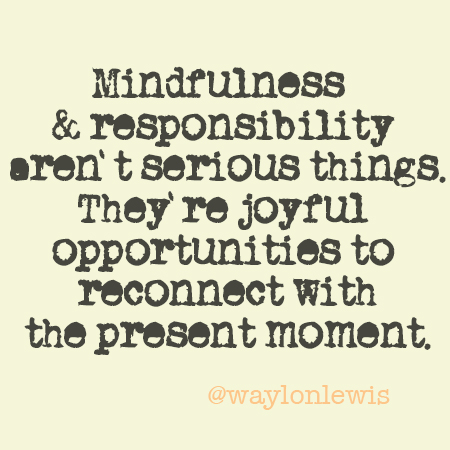Mindfulness helps us live in the present moment, where we can find our joy.
Our beliefs and feelings about ourselves come from the past. The secret to recovery is realizing that we have already survived everything that has ever happened to us.
The healing we are seeking can only be found now—in the present moment.
As we set out on our healing journey, the most important skill to train in is mindfulness. Mindfulness is our essential tool—there are many ways to strengthen our ability to maintain the continuity of our awareness in the present moment.
But what exactly does mindfulness mean?
Mindfulness means learning to stay with ourselves and not losing sight of where our attention is placed. It means bringing ourselves back to the present moment repeatedly throughout the day.
We bring ourselves back, notice when we’ve drifted away, and bring ourselves back again. It is the opposite of distraction and dissociation. Mindfulness is our greatest support and will come in handy every step of the way as we traverse the healing journey.
The Buddhist term for strengthening our mindfulness is “taming the mind.”
When we say, “taming our mind,” it means that we are training and building up our “mindful muscles” to directly work with our mental confusion and difficult emotions. Training here does not mean meditation boot camp. Rather, it means developing an openness and caring towards our mind—reminding ourselves that our situation is workable. Even if we need “to fake it until we make it,” it is important to trust ourselves, take a seat of authority inside ourselves and learn to listen to our inner guide.
As long as we can imagine the possibility of change—and we have the willingness to try—our spiritual practice is off to a good start. We can heal and find our innate joy and happiness.
When I first started my “sitting practice,” I could barely sit still for one second. My meditation teacher always said, “Not a problem! Appreciate the richness in all that activity.”
It does not help to think about what other people are experiencing when they sit on their cushions or wonder if we’re supposed to be having some different kind of experience. That kind of thinking always brings us down. We must appreciate our own unique, naked and beautiful mind.
As we work on developing our daily practice, it’s important to understand what it means to be disciplined.
Discipline, on the spiritual journey, is not about following a set of rules. It is about getting in touch with our desire and determination to feel better. We learn to listen to our own inner knowing, rather than trusting some outer figure. It is about taking responsibility for ourselves, standing on our own two feet, noticing when we make mistakes and learning how to self-correct. This kind of discipline is not fear based—it comes from our own internal wish to be happy.
We work on correcting the patterns of behavior that we know are not good for us—replacing old habits with new ones. We are doing it because we want to and we know it will make us happy. This is a self-determination that comes from our own trust in ourselves. We are moving toward our vision of wholeness and peace.
I can’t say enough about mindful discipline, as I have worked with enough people to feel certain that change does not come about from simply talking about how much we want to be different.
Change comes from loving ourselves so much that we become dedicated to going about life in a different way. This includes how we are working on our recovery. We can continue to treat ourselves poorly or begin taking care of ourselves—talking to ourselves in a kind voice, soothing those scared inner children.
It’s not about following a list of rules, but rather working with our own mind. It has to come from our own heart.
Mindfulness—learning to be present with yourself in your life—is the key.
The actual practice takes place moment by moment, throughout the day, and influences everything we do. There are many ways to train and different practices to try. We may need to try them all—to see which ones work for us—then apply them in a personal to our own healing journey.
.
Relephant Read:
Mindfulness Meditation to Transform our World.
.
Author: Tina Fossella
Editor: Yoli Ramazzina
Photo: @waylonlewis


 Share on bsky
Share on bsky





Read 1 comment and reply